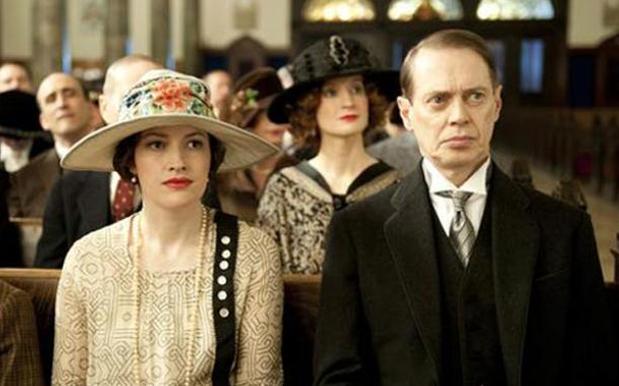
Terence Winter, a multiple Emmy-winner, former Sopranos staff writer and and the showrunner, head writer and creator of HBO prohibition crime drama series Boardwalk Empire talks about the process of killing your darlings, working with Martin Scorsese and the future of Nucky Thompson.
Season two ended with Jimmy Darmody’s death. Do we ever find Jimmy’s body? Does his death come back in some way? His death has psychological ramifications and in some cases practical ramifications for other characters on the show. That’s about as much as I’m comfortable saying.
What new storylines do you have this season? The reality of the bootlegging world in 1923 was that the competition became much greater. In 1920 people started stockpiling alcohol for their own use. By 1923 people had underestimated how much they drank and it started to run out. So Nucky faces a new breed of gangster. We have a new guy, Gyp Rosetti – an unbelievably hair triggered violent guy. We think he’s a great nemesis for Nucky.
It’s a great opening scene for Gyp – he explodes with such violence at such little provocation. Who is he? Gyp Rosetti is a New York gangster – not based on anyone in particular. He’s an amalgam. He operates out of the lower west side of Manhattan, pays up to Joe Masseria. Gyp has a hair trigger temper; he’s very ambitious but also probably has low self-esteem. He takes it as a great insult that Nucky refuses to do business with him, even though he’s making the same decree with everybody. Gyp decides to take matters into his own hands and you’ll see how that has ramifications for Nucky.
Nucky’s marriage to Margaret isn’t looking good. By the end of the first episode, you realise that even though they’re outwardly a happy successful couple that’s all a facade. They don’t really even live together. He’s back at The Ritz, back to his old ways – he’s got a girlfriend who’s a showgirl in New York.
Margaret seems to be involved in a battle over reproductive rights…Margaret’s lost a baby herself – so the whole idea of women’s reproductive rights is on her mind. It’s symbolised metaphorically by Carrie Duncan, a female pilot who is embarking on a journey across the USA – partly what was going on topically in the 1920’s and partly as a journey for our character.
Reproductive rights are a contentious issue even today in America. The more things change the more they stay the same. The whole idea about women’s reproductive rights is so topical. Birth control was illegal in 1923. That’s a perfect way to hold a mirror up to what was going on without even having to create a story.
Van Alden is still with us – he’s a salesman but there’s a scene in a flower shop where it looks like he could turn gangster. As the series progresses it might turn out that the thing that Van Alden is good at is being a gangster. The guy started out as this upright lawman trying to negotiate his way through this world where people pretend to play by the rules, but don’t. You’re doomed to failure if you think that people are going to obey the law and obey God. The joke is no-one takes that seriously but he did and he, of course, failed.
The way that you’re developing the young Al Capone is really interesting…Yeah, 1923 was the year Al Capone started to become the Capone that we know and love. Jonny Torrio took an extended trip to Italy, left Capone in charge and Capone started to become more in control of the gang. By the end of ’23 into ’24 Capone was really the guy we recognise. We also get to spend a little more time with Capone at home, with his son.
Why is that fascinating for you as a writer? People who live outside of the norm are always fascinating to me. It’s a way of vicariously being part of that world without the consequences. You get to hang out with Nucky or Tony Soprano and then at the end of the hour you can turn the TV off and go back to being yourself again. Nobody is coming after you with a gun.
How closely is Martin Scorsese still involved? At the beginning of the year I’ll pitch him what the season is about and then as we start writing outlines and scripts he’ll read all of them – even the revisions of scripts as they go along. He still weighs in on our casting choices. As we get cuts of the episodes that come in, he starts watching them, gives us editing suggestions, music suggestions.
Might he get back behind the camera again? I hope he does at some point – he certainly knows that door is always open; it’s really a question of his feature schedule.
Do you think television is an art form now? Yeah, it’s certainly usurping what’s happening in cinema. One of the most flattering things that anyone said about Boardwalk was that it almost feels like it will forever blur the lines between television and cinema. It’s grand as any movie in terms of its scope and subject matter and what it looks like. The fact that it’s on TV is almost superfluous. I’ve sometimes forgotten where I’ve seen a certain movie for the first time – or on a plane or in a movie theatre? The delivery system is becoming secondary and I think in our lifetimes we’ll reach the point where it doesn’t matter.
How many seasons have you got, creatively? I don’t know exactly. I do know how Nucky wraps up. When that happens, does it really effect how I tell the story? I hope we have several more seasons to go. I would love to do a big sweeping epic that involves the prohibition era and if that takes us through ‘til prohibition was repealed in 1933 that would be a great ending point to it.
Boardwalk Empire: The Complete Third Season is available to own on Blu-ray and DVD on August 21.



